Tezos Smart Rollups and the Amazing Benefits They Bring To Custom Blockchain
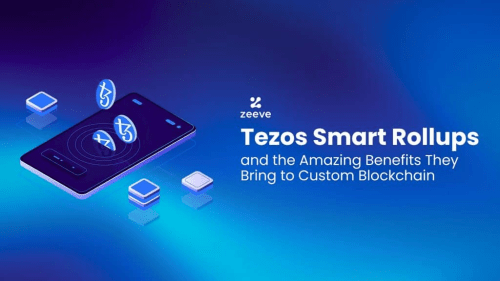
“Scalability is the holy grail of blockchain technology.” – this line was said by Vitalik, the co-founder of Ethereum. Vitalik’s words ring true as the blockchain ecosystem continues to change. Developers are always seeking new ways to solve the industry’s scalability issues. Enter Tezos Smart Rollups, a modern-day Layer 2 scaling solution that aims to remold the way we build and deploy decentralised applications.
Tezos Smart Rollups bring along numerous benefits for custom blockchains. They help custom blockchains improve scalability, reduce transaction costs, and provide extra security without compromising on decentralization of that blockchain. This scaling solution offers Tezos Smart Rollup benefits such as flexibility and efficiency needed for custom blockchains to perform in a manner that is well-tailored to their specific application.
In this article, we will see the technology behind Tezos Smart Rollups that is projected to handle 100000 TPS soon and some of the best Rollup benefits it bring to the table for custom blockchains.
What are Tezos Smart Rollups?
Tezos Smart Rollups are an advanced layer 2 scaling solution designed to scale the Tezos blockchain by handling transactions off the main chain (layer 1) and only settling final states on-chain. This approach uses the strengths of the Tezos blockchain. Its formal verification and flexible design will boost transaction speed. This won’t harm security or decentralization.
Here’s an example of how they work:
Source: Tezos
Image text showing: A Smart Rollup interacting with layer 1 by receiving a message, running processing based on that message, and then sending a transaction to layer 1.
The ‘Smart’ in Tezos Smart Optimistic Rollups is no misnomer.
In optimistic rollups, others usually trust claims about the state of the rollup. Tezos smart rollups feature a refutation mechanism where participants can challenge and impose financial penalties on those submitting false claims. This mechanism ensures the correctness of the rollup’s state, as even if only one honest participant challenges an invalid claim, it is enough to guarantee the system’s integrity.
Underlying Technology Behind Tezos’ Smart Optimistic Rollups
One of the most crucial benefits of Tezos Smart Rollups is that they enable the blockchain to scale beyond one million transactions per second without compromising on decentralization. Doing so, Tezos has created these protocols permissionless and decentralized, which means anyone can deploy a rollup (provided they meet Tezos blockchain requirements). But the underlying technology behind Tezos’s Smart Rollup benefits is much more than that.
WebAssembly (WASM)
Tezos Smart Rollups base their core logic on WebAssembly. This lets developers write code in various high-level languages that compile to WASM. This inclusivity fosters a broad development ecosystem.
Permissionless and Decentralized
In line with blockchain’s ethos, these rollups are permissionless. Anyone can join the rollup process as a developer or validator, without central approval. This open participation helps in maintaining a decentralized network structure.
Proof-generating Virtual Machine (PVM)
The PVM is a key benefit of Tezos Smart Rollups. It ensures that each state transition within the rollup is valid. It provides a strong framework for verifiable computations. This boosts the integrity of the rollup operations.
Rollup Kernel
Tezos Smart Rollups use a rollup kernel. It processes all incoming transactions based on the logic in the WASM code. This kernel can interact with the Tezos main chain. It can also adapt to different transaction types and conditions.
Tezos Smart Rollup Benefits
Tezos Smart Rollups bring many benefits to the Layer-1 blockchain. They provide developers with the infrastructure to build custom apps on it and scale without any complexities to deal with. Let’s understand some other benefits that they bring to custom blockchains in details
- Decentralization with Permissionless Fraud-Proof Mechanisms
Tezos Smart Rollups are built into the Tezos protocol. This lets them work with layer 1 features and inherit the blockchain’s security and decentralization.
The system lets anyone submit fraud proofs to challenge bad transactions. This feature protects the network from abuses. It also empowers participants to act as watchdogs, which reinforces its decentralization.
- Flexibility in Development with Multi-Language Support
Developers are enabling them to use any programming language that compiles to WASM. Examples include Rust, C++, or AssemblyScript, offering tremendous flexibility and accessible development choices.
Rust’s advanced SDK empowers developers to streamline smart contract creation. This toolkit is advanced. It simplifies testing and deploying rollup solutions and boosts efficiency in blockchain development. With powerful tools, programmers can focus on innovation, not tech issues.
- Enhanced Privacy Options with ZK-Proofs
Nomadic Labs, the R&D team behind Tezos, announced Private Smart Rollups on Tezos earlier this year. Tezos Smart Rollups can now use zk-proofs. Which means, they can validate transactions without revealing the data. This adds an optional layer of privacy.
Zk-Proofs provide optional privacy for simple transactions. Yet, zk-proofs become complicated and resource-intensive for complex transactions and multi-participant smart contracts.
- Scalability and Performance
Tezos Smart Rollups process transactions on a secondary layer. This offloads the main chain’s work. It can now focus on consensus and finality. As a result, throughput increases.
Also, these rollups can scale both ways. They can add nodes to handle higher loads. Or, they can upgrade existing resources to process more transactions. This makes them a feasible solution for processing high transaction volumes.
- Data Availability Committees (DAC) for More Privacy
Traditional rollups post transaction data publicly on Layer 1 for verification. But, to enhance privacy, some rollups use a Data Availability Committee (DAC). This DAC stores transaction data privately and is typically controlled by a consortium of interested parties.
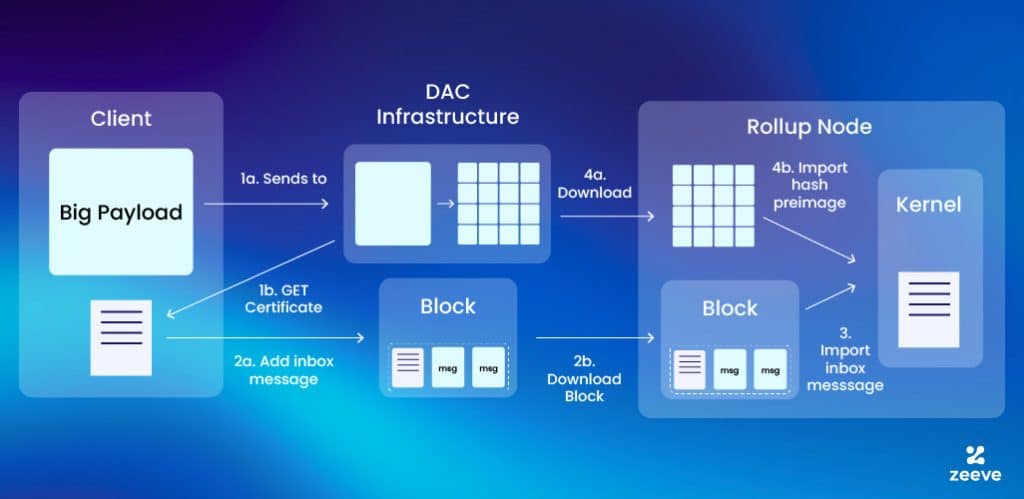
Source: Nomadic Labs
Image Text: Example of a workflow of DAC infrastructure
While this approach safeguards sensitive information, it compromises public verifiability. Anyone outside the DAC cannot independently verify the accuracy of the rollup’s state.
Example: A Consortium of Banks
Consider a group of banks using a Smart Rollup for swift and transparent settlements. To maintain confidentiality, transaction details are kept within a non-public DAC. Only cryptographic commitments, which conceal the underlying data, are shared publicly. This arrangement prioritizes data privacy over full public auditability.
Another one of the Tezos Smart Rollup benefits is that DACs offer increased privacy at the expense of decentralization. This trade-off is especially important in industries like finance, where data privacy is extremely important.
- Whitelisting: A Tailored Approach for Custom Blockchains
Whitelisting helps the builders of custom blockchains to thoroughly shape their platform’s accessibility and security. By limiting the use of a Smart Rollup, developers can create a controlled environment. It will be perfect for their use case. We call it a ‘Private Rollup.’
Authorized Access
This approach offers several advantages. For sensitive areas like finance and supply chains, whitelisting is key. Unauthorized access to transaction data is blocked, while authorized parties retain processing rights. This system safeguards information integrity and confidentiality. Also, limiting potential operators reduces the risk of attacks and errors. This protects the blockchain’s integrity and its users.
Effective for Developers
Whitelisting also serves as a valuable tool for developers during the testing phase. They can conduct thorough evaluations and iterations within a private network before exposing the rollup to the public, minimizing the chances of unforeseen issues. This gradual decentralization approach allows for a balance between security and community participation as the project matures.
Custom Governance Models
Furthermore, whitelisting can be instrumental in implementing custom governance models. By granting specific entities greater control over the rollup’s operations and decision-making processes, developers can tailor the blockchain to meet the unique needs of their target audience.
In essence, whitelisting provides blockchain builders with the flexibility to create tailored solutions that focus on security, control, and privacy while still allowing for gradual decentralization.
These Smart Rollups have already been implemented by many players in the Web3 world to customize their blockchains and flourish in the industry.
Choose Zeeve RaaS for Tezos Smart Rollups
We are a comprehensive Rollups-as-a-Service (RaaS) platform designed to simplify and speed up the deployment, management, and scaling of rollup chains within the blockchain ecosystem. Zeeve has expanded its RaaS capabilities to support all the Tezos Smart Rollup benefits, which are optimized for high availability, security, and decentralization. The platform lets users deploy and manage Tezos rollups. It offers unique benefits like gasless transactions, WASM support, and high customization.
If you are planning to build on Tezos Smart Rollups, use our RaaS platform to launch a testnet in few clicks. Build with over 40+ 3rd party integrations on-demand to augment the power of your rollup.
Want to see a demo? Schedule a call with us today!


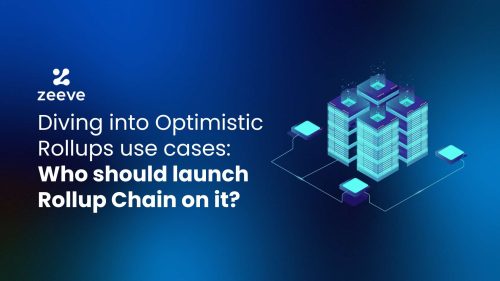
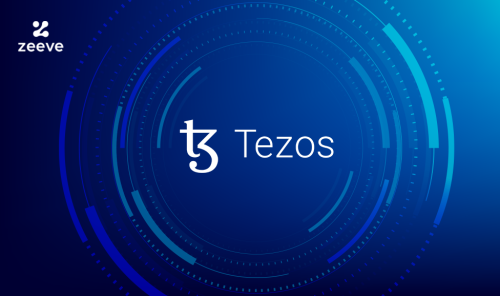
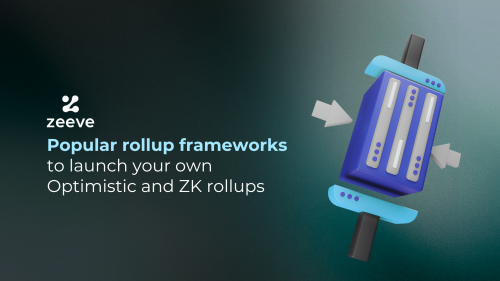
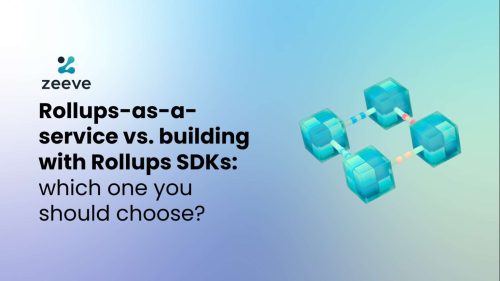
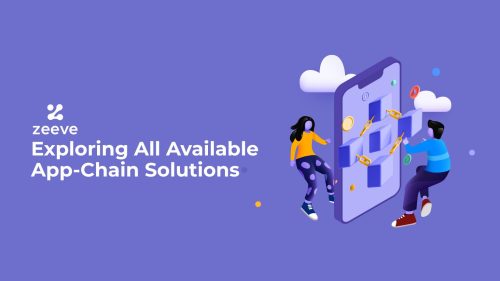
Responses